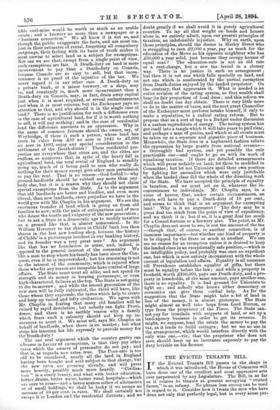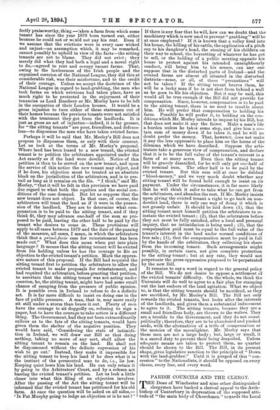111.E EVICTED TENANTS BILL.
IF the Evicted Tenants Bill passes in the shape in which it was introduced, the House of Commons will have done one of the cruellest and most oppressive acts ever perpetrated by any Legislature. The Bill, in as far as it relates to tenants at present occupying " evicted farms," is an infamy. No phrase less strong can be used in regard to it. Consider how it treats the men who have done not only that perfectly legal, but in every sense per- fectly praiseworthy, thing,—taken a farm from which some tenant has since the year 1878 been turned out, either because he could not or would not pay his rent. Even if we assume that the evictions were in every case wicked and unjust—an assumption which, it may be remarked, cannot possibly be upheld in view of the facts—the sitting tenants are not to blame. They did not evict ; they merely did what they had both a legal and a moral right to do,—agreed to rent and occupy vacant farms. That, owing to the lawlessness of the Irish people and the organised coercion of the National League, they did this at considerable risk, was their misfortune, and to the credit of their courage. Unless we accept the doctrines of the National League in regard to land-grabbing, the men who took farms on which evictions had taken place, have as much right to be protected in the enjoyment of their tenancies as Lord Rosebery or Mr. Morley have to be left in the occupation of their London houses. It would be a gross injustice to turn either of these statesmen out of their homes because the previous tenants were not satisfied with the treatment they got from the landlords. It is just as gross an act of injustice—indeed, it is far grosser, for "the sitting tenants" are poor, friendless, and defence- less—to dispossess the men who have taken evicted farms.
Perhaps it will be said that Mr. Morley's Bill does not propose to dispossess them, or only with their consent. Let us look at the terms of Mr. Morley's proposal. Where land has been leased to a new tenant, the evicted tenant is to petition the arbitrators appointed under the Act exactly as if the land were derelict. Notice of this petition is then to be served on the new tenant, and upon the service of this notice the new tenant may object, and if he does, his objection must be treated as an absolute block on the jurisdiction of the arbitrators, and is to pre- vail as long as it remains on the file. " I think," said Mr. Morley, "that it will be felt in this provision we have paid due regard to what both the equities and the social con- ditions of the case demand. But let us suppose that the new tenant does not object. In that case, of course, the arbitrators will treat the land as if it were in the posses- sion of the landlord. They are to determine what com- pensation is to be paid to the sitting tenant, and if they think fit, they may advance one-half of the sum so pro- posed to be paid, leaving the other half to be paid by the tenant who desires to come in. These provisions will apply to all cases between 1879 and the date of the passing of the measure, all cases, I mean, in which the arbitrators think that a primci-facie case for reinstatement has been made out." What does this mean when put into plain language ? It means that the sitting tenant will be evicted from his holding unless he has the courage to file an objection to the evicted tenant's petition. Mark the oppres- sive nature of this proposal. If the Bill had required the sitting tenant first to petition the arbitrators to allow the evicted tenant to make proposals for reinstatement, and had required the arbitrators, before granting that petition, to ascertain that the sitting tenant was not acting under coercion, he, the sitting tenant, might have had some small chance of escaping from the pressure of public opinion. It is possible even in Ireland to refuse to do a definite act. It is far more difficult to insist on doing one in the face of public pressure. A man, that is, may more easily sit still under a storm than brave it out. Plenty of men have the courage to sit doggedly on, refusing to sign a paper, but to have the courage to take action is a. different thing. The Government, had they not been extraordinarily callous as to the fate of the sitting tenants, would have given them the shelter of the negative position. They would have said, Considering the state of intimida- tion in Ireland, we will draw our Bill so that doing nothing, taking no move of any sort, shall allow the sitting tenant to remain on the land. He shall not be dispossessed without the definite expression of his wish to go out.' Instead, they make it impossible for the sitting tenant to keep his land if he does what it is the instinct of the persecuted man to do, i.e., lie low. Keeping quiet loses him his land. He can only retain it by going to the Arbitrators' Court, and by a solemn act barring the evicted tenant's petition. Let us look a little closer into what this filing of an objection involves. After the passing of the Act the sitting tenant will be informed that the evicted tenant has petitioned for his old farm. At once the question will be asked on all sides,— ' Is Pat Murphy going to lodge an objection or is he not ? ' If there is any fear that he will, how can we doubt that the machinery which is now used to prevent " grabbing" will be at once employed ? If it is known that a volley fired into his house, the killing of his cattle, the application of a pitch cap to his daughter's head, the stoning of his childrbn on their way to school, the boycotting of whatever he has got to sell, or the holding of a public meeting opposite his house to protest against his intended unneighbourly conduct, will bring him to his senses, can any one suppose that in the disturbed parts of Ireland—and the evicted farms are almost all situated in the disturbed districts—some, or all, of these " precautions " will not be taken ? If the sitting tenant braves them, he will be a lucky man if he is not shot from behind a wall as he goes to file his objection. But it may be said, this would all be true enough if the Bill did not provide for compensation. Since, however, compensation is to be paid to the sitting tenant, there is no need to trouble about him. He will prefer that compensation to holding his farm. Possibly he will prefer it, to holding on the con- ditions which Mr. Morley intends to impose by his Bill, but that does not make it any the fairer. Make a man's life a burden unless he takes some step, and give him a cer- tain sum of money down if he takes it, and he will no doubt prefer the money. That, however, does not make it any the less oppressive to place him on the horns of the dilemma which we have described. Suppose the arbi- trators take a generous view of compensation, and declare that it is to be the full value of the tenant's interest in a farm of so many acres. Even then the sitting tenant will be gravely damnified, for he will only get one-half of the nominal sum. The other half is to be paid by the evicted tenant. But this sum will at once be dubbed " blood-money," and we very much doubt whether any sitting tenant will be found bold enough to insist on its payment. Under the circumstances, it is far more likely that he will think it safer to take what he can get from the arbitrators, and abandon the rest. If Mr. Morley insists upon giving the evicted tenant a right to go back on non- derelict land, there is only one way of doing it which is not grossly unfair. It should be laid down (1), that the sitting tenant must himself petition the arbitrators to re- instate the evicted tenant ; (2), that the arbitrators before they act must be fully satisfied, after a local and personal inquiry, that no intimidation is being used ; (3), that the compensation paid must be equal to the full value of the tenant's interest in the land under normal conditions of free sale ; (4), that the compensation must be paid in full by the hands of the arbitrators, they collecting his share from the in-coming tenant. Such arrangements might possibly, in certain cases, not give complete protection to the sitting tenant ; but at any rate, they would not perpetuate the gross oppression proposed to be perpetrated by the new Bill.
It remains to say a word in regard to the general policy of the Bill. We do not desire to oppose a settlement of the evicted tenants' difficulty. On the whole, we think the Unionists will do well to agree to a fair plan for stamping out the last embers of the land agitation. What we object to, is that the sitting tenants should be sacrificed, as they are sacrificed, by Mr. Morley's Bill. The Bill not only rewards the evicted tenants, but looks after the interests of the landlords, and gives them a substantial inducement to agree to it. The sitting tenants, because they are a small and friendless body, are thrown to the wolves. They are a trouble to the Government, and they do not count politically ; therefore, they are to be abandoned and pushed aside, with the alternatives of a trifle of compensation or the mercies of the moonlighter. Mr. Morley says that these men are not a large body ; but, large or small, it is a sacred duty to prevent their being despoiled. Unless adequate means are taken to protect them, no quarter should be shown to the Bill. The Bill, in its present shape, gives legislative sanction to the principle of " Down with the land-grabber." Until it is purged of this " con- cession" to the Nationalists, it should be opposed on every clause, every line, and every word.



















































 Previous page
Previous page